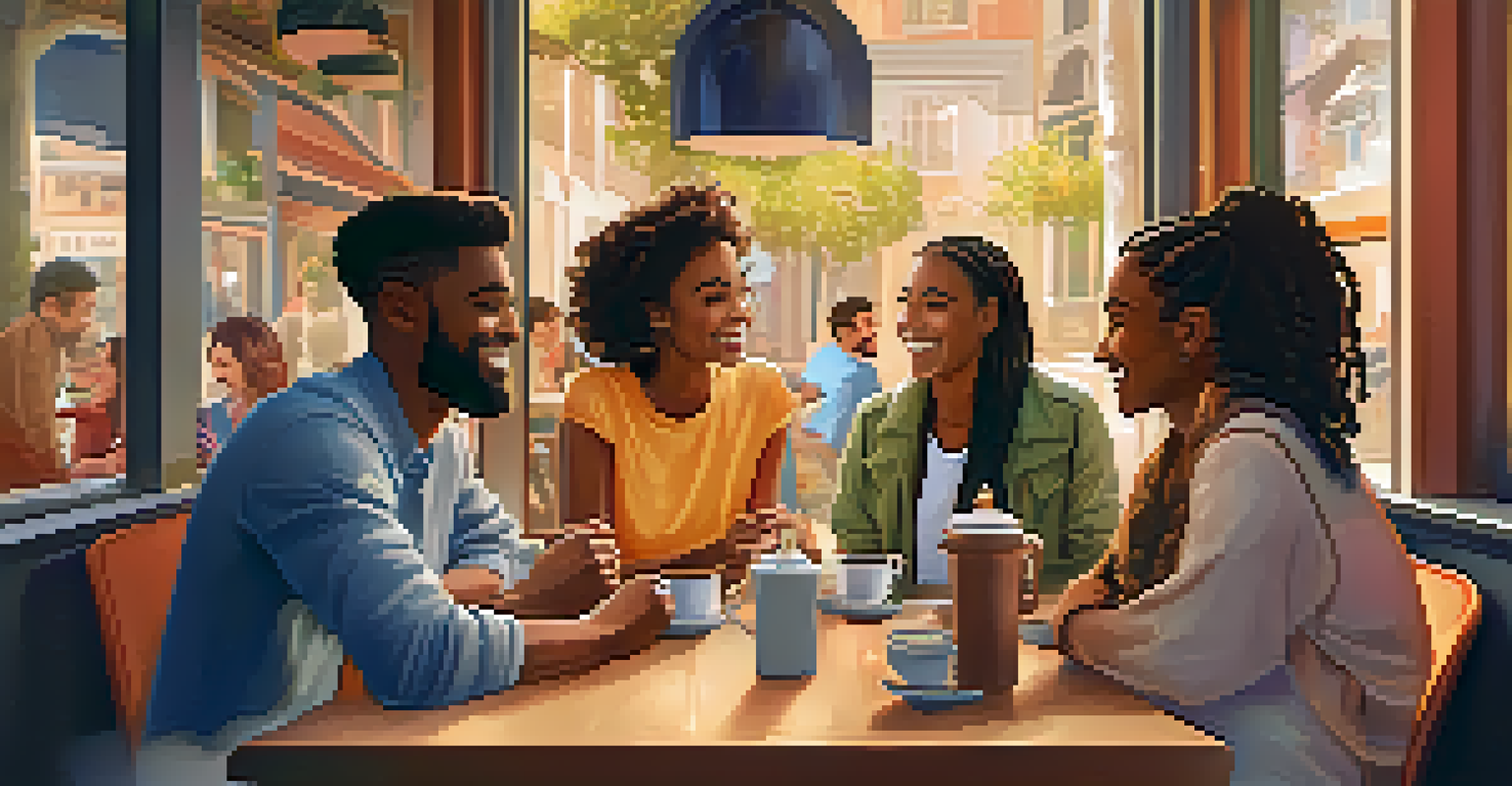Social Media and Anxiety: A Double-Edged Sword

Understanding Social Media's Impact on Mental Health
Social media has become an integral part of our daily lives, shaping how we connect and communicate. While it offers a platform for sharing experiences and finding community, it can also contribute to feelings of anxiety. Many users report feeling overwhelmed by the constant stream of information and the pressure to maintain a curated online persona.
Social media can be both a blessing and a curse, as it connects us to others while also exposing us to unrealistic expectations.
The paradox lies in the fact that social media can foster connections, yet it can also create feelings of isolation. As individuals compare their lives to the highlight reels of others, they may feel inadequate or left out. This cycle of comparison often leads to increased anxiety, especially among younger users who are still developing their self-esteem.
Recognizing these impacts is the first step toward managing social media use. Understanding how platforms affect our mental health can empower users to make conscious choices about their online presence and interactions.
The Pressure of Perfection on Social Media
In a world where likes and shares often equate to social validation, many users feel the pressure to present a perfect image online. This can lead to a constant state of anxiety, where users feel they must keep up with unrealistic standards. The curated lives seen on social media can make real life feel dull in comparison, fostering dissatisfaction and unease.

This pressure to appear flawless is particularly prevalent among influencers and public figures. They often face scrutiny, which can lead to mental health issues, including anxiety and depression. As followers compare their own lives to these idealized versions, they might spiral into negative self-talk and feelings of inadequacy.
It's essential to remember that social media is just a snapshot of life, often filtered and edited to showcase the best moments. By acknowledging this, users can find comfort in their authenticity, reducing the pressure to conform to these unrealistic standards.
The Role of Online Communities in Alleviating Anxiety
While social media can contribute to anxiety, it also has the power to provide support and connection. Online communities allow individuals to share their experiences and find others who understand their struggles. This sense of belonging can be incredibly comforting, especially for those who may feel isolated in their offline lives.
Comparison is the thief of joy.
Support groups, forums, and pages dedicated to mental health topics can serve as safe spaces for individuals to express their feelings without judgment. Sharing personal stories can create a sense of shared experience, making it easier for users to feel validated and less alone. In this way, social media can be a tool for healing rather than harm.
However, it's important to engage with these communities mindfully. Users should seek out positive spaces that encourage growth and understanding, rather than those that may perpetuate negativity or toxic behaviors.
Managing Anxiety Triggers on Social Media
Awareness is key when it comes to managing anxiety triggers on social media. Users should pay attention to how certain interactions or content make them feel. For instance, if scrolling through a particular feed leaves you feeling anxious or upset, it might be time to reassess your engagement with that account.
Setting boundaries can be a powerful way to reclaim control over your mental health. This could mean limiting time spent on social media, unfollowing accounts that don’t bring joy, or even taking regular breaks. By curating your online experience, you can reduce exposure to triggers and create a more positive environment.
Additionally, practicing mindfulness can help users ground themselves in the present moment. Techniques like deep breathing or journaling about their feelings can empower individuals to navigate the complexities of social media without succumbing to anxiety.
The Impact of Fear of Missing Out (FOMO)
The Fear of Missing Out, commonly known as FOMO, is a significant contributor to social media-related anxiety. Users may feel compelled to stay connected at all times, fearing they might miss important updates or social events. This constant need to be 'in the know' can lead to a cycle of anxiety and stress.
FOMO is often fueled by the curated nature of social media, where friends and influencers showcase their exciting lives. This can lead to feelings of inadequacy, as individuals compare their daily routines to the highlights of others. The relentless pursuit of social engagement can create a sense of urgency and unease.
To combat FOMO, individuals can practice gratitude and focus on their own experiences. By recognizing the value in their personal lives, they can shift their perspective and lessen the impact of social media on their mental health.
Finding Balance: Healthy Social Media Habits
Creating a healthy relationship with social media is essential for mental well-being. This involves finding a balance between online interactions and real-life connections. Engaging in activities that promote mental health—such as spending time outdoors, pursuing hobbies, or connecting with loved ones—can help mitigate the negative effects of social media.
Setting specific times for social media use can also create a sense of structure. For example, designating certain hours for checking platforms can prevent mindless scrolling and reduce the feeling of being overwhelmed. This intentional approach makes social media feel less intrusive and more manageable.
Lastly, remember that it's okay to disconnect. Taking breaks from social media can provide much-needed clarity and space to recharge. By prioritizing mental health, users can enjoy the benefits of social media without the accompanying anxiety.
The Future of Social Media and Mental Health Awareness
As social media continues to evolve, so does the conversation surrounding mental health. More platforms are beginning to implement features aimed at promoting well-being, such as screen time reminders and content warnings. This shift indicates a growing awareness of the impact social media can have on mental health and the necessity of addressing it.
Increased advocacy for mental health awareness is also crucial. Influencers and public figures are using their platforms to discuss mental health openly, which helps destigmatize these conversations. By sharing personal stories and strategies for coping, they can inspire others to seek help and support.

Looking ahead, it's essential for users to remain proactive about their mental health. By staying informed and engaged in discussions about social media's impact, individuals can better navigate the complexities of their online experiences and foster a healthier relationship with technology.